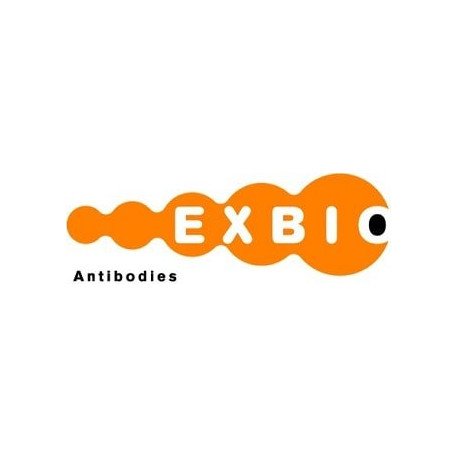Cart 0 Product Products (empty)
No products
To be determined Shipping
0,00 € Total
Prices are tax excluded
Product successfully added to your shopping cart
Quantity
Total
There are 0 items in your cart. There is 1 item in your cart.
Total products (tax excl.)
Total shipping (tax excl.) To be determined
Total (tax excl.)
Data sheet of Hamster Monoclonal to CD3 zeta (CD247)
| Brand | Exbio |
| Product type | Primary antibodies |
| Reactivity | Human, Mouse |
| Clonality | Monoclonal |
More info about Hamster Monoclonal to CD3 zeta (CD247)
| Brand: | Exbio |
| Product no.: | 10-568-C025 |
| Product type: | Primary antibodies |
| Host species: | Hamster |
| Product name: | Hamster Monoclonal to CD3 zeta (CD247) |
| Antigen: | CD3 zeta (CD247) |
| Clonality: | Monoclonal |
| Clone: | H146-968 |
| Isotype: | IgG2 |
| Immunogen: | Synthetic peptide corresponding to amino acids 151-164 of mouse CD3 zeta. _x000D_ |
| Format: | azide free |
| Specificity: | The Armenian hamster antibody H146-968 reacts with CD3 zeta chain (CD247), which is a component of TCR/CD3 complex expressed on T cells. |
| Categories: | CD and Related Antigens & MHC (Rodent), CD and Related Antigens (Human) |
| Concentration: | 1 mg/ml |
| Storage buffer: | Azide free phosphate buffered saline (PBS), approx. pH 7.4; 0.2 μm filter sterilized. |
| Storage / stability: | Store at 2-8°C. Do not freeze. Do not use after expiration date stamped on vial label. |
| Background: | CD3 complex is crucial in transducing antigen-recognition signals into the cytoplasm of T cells and in regulating the cell surface expression of the TCR complex. T cell activation through the antigen receptor (TCR) involves the cytoplasmic tails of the CD3 subunits CD3 gamma, CD3 delta, CD3 epsilon and CD3 zeta (CD247). These CD3 subunits are structurally related members of the immunoglobulins super family encoded by closely linked genes on human chromosome 11. The CD3 components have long cytoplasmic tails that associate with cytoplasmic signal transduction molecules. This association is mediated at least in part by a double tyrosine-based motif present in a single copy in the CD3 subunits. CD3 may play a role in TCR-induced growth arrest, cell survival and proliferation. |
| Purity: | > 95% (by SDS-PAGE) |
| Purification: | Purified by protein-A affinity chromatography |
| Product specific references: | *Scumpia PO, Delano MJ, Kelly-Scumpia KM, Weinstein JS, Wynn JL, Winfield RD, Xia C, Chung CS, Ayala A, Atkinson MA, Reeves WH, Clare-Salzler MJ, Moldawer LL: Treatment with GITR agonistic antibody corrects adaptive immune dysfunction in sepsis. Blood. 2007 Nov 15;110(10):3673-81., *Doyon L, Hanna Z, Jolicoeur P, Sékaly RP: Early expression of human CD4 delays thymic differentiation in transgenic mice. Res Immunol. 1994 Jan;145(1):5-16., *Kikuchi-Maki A, Catina TL, Campbell KS: Cutting edge: KIR2DL4 transduces signals into human NK cells through association with the Fc receptor gamma protein. J Immunol. 2005 Apr 1;174(7):3859-63., *Iida T, Ohno H, Nakaseko C, Sakuma M, Takeda-Ezaki M, Arase H, Kominami E, Fujisawa T, Saito T: Regulation of cell surface expression of CTLA-4 by secretion of CTLA-4-containing lysosomes upon activation of CD4+ T cells. J Immunol. 2000 Nov 1;165(9):5062-8., *Kosugi A, Saitoh S, Noda S, Yasuda K, Hayashi F, Ogata M, Hamaoka T: Translocation of tyrosine-phosphorylated TCRzeta chain to glycolipid-enriched membrane domains upon T cell activation. Int Immunol. 1999 Sep;11(9):1395-401., *Bäckström BT, Hausmann BT, Palmer E: Signaling efficiency of the T cell receptor controlled by a single amino acid in _x000D_ the beta chain constant region. J Exp Med. 1997 Dec 1;186(11):1933-8., *Kishimoto H, Kubo RT, Yorifuji H, Nakayama T, Asano Y, Tada T: Physical dissociation of the TCR-CD3 complex accompanies receptor ligation. J Exp Med. 1995 Dec 1;182(6):1997-2006._x000D_ , *Rozdzial MM, Kubo RT, Turner SL, Finkel TH: Developmental regulation of the TCR zeta-chain. Differential expression and tyrosine phosphorylation of the TCR zeta-chain in resting immature and mature T lymphocytes. J Immunol. 1994 Aug 15;153(4):1563-80._x000D_ |
| General references: | *Alarcón B, Swamy M, van Santen HM, Schamel WW: T-cell antigen-receptor stoichiometry: pre-clustering for sensitivity. EMBO Rep. 2006 May;7(5):490-5. , *Kuhns MS, Davis MM, Garcia KC: Deconstructing the form and function of the TCR/CD3 complex. Immunity. 2006 Feb;24(2):133-9., *Huang Y, Wange RL: T cell receptor signaling: beyond complex complexes. J Biol Chem. 2004 Jul 9;279(28):28827-30. |
| Related products: | - Hamster Monoclonal to Helios - Hamster Monoclonal to CD79b (mouse) - Hamster Monoclonal to CD80 |
| Shipping condition: | Room temperature |


